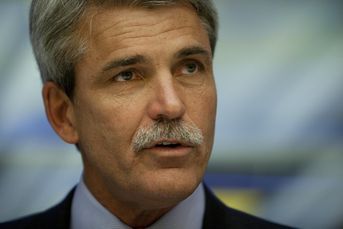UBS shrinks recruiting costs in 2017, boosts adviser pay
Both trends reflect the firm's shift away from recruiting in favor of increasing the compensation of existing brokers.
In line with a shift in recruiting strategy, UBS Wealth Management Americas last year reduced the amount of money it spent on signing bonuses for new brokers, while at the same time increasing compensation for existing advisers.
The firm reduced the signing bonuses, usually in the form of forgivable loans, by $54 million, or 7%, in 2017, according to the annual report of its parent company, UBS AG.
In 2017, UBS Wealth Management Americas listed an expense of $754 million for “compensation commitments with recruited financial advisers,” compared with $808 million a year earlier, according to the report, which was released Friday.
Meanwhile, compensation to UBS Wealth Management advisers increased 13.8% in 2017, reaching $3.3 billion compared with $2.9 billion in 2016, according to the report
Almost two years ago, UBS Wealth Management Americas said it would shift strategies and focus efforts on retention of top-producing advisers and cut back on recruitment.
That was announced in June 2016, when the company said it would focus on a new operating model meant to drive organic growth “through an increased focus on adviser retention,” according to Tom Naratil, the firm’s president at the time and now co-president.
At the time, the firm launched a new adviser compensation plan that would boost payouts for advisers with the largest books of business and incentives for advisers to form teams. UBS said it intended to reduce adviser recruiting by 40%. The adviser compensation plan took effect January 1, 2017.
UBS noted in its annual report that the higher comp for advisers, coupled with lower expenses for recruits, was part of the change in strategy two years ago.
“The higher financial adviser compensation reflects higher compensable revenues as well as changes we announced in 2016 to our financial adviser compensation model,” the report said. “The increase in salaries and other personnel costs is due to an increase in support staff. These increases were partly offset by lower expenses for compensation commitments with recruited financial advisers.”
UBS Wealth Management Americas continued to back away from recruiting brokers and advisers when it said in November it would exit the protocol for broker recruiting; the agreement makes it easier for brokers and advisers to move to new firms with clients when switching employers. Morgan Stanley said a month earlier it was dumping the protocol.
For years, large wirehouses like UBS and Morgan Stanley have been dealing with the decline in the number of experienced advisers, either from retirement or leaving to start an RIA or work at an independent broker-dealer.
And while the four wirehouses — Morgan Stanley, Merrill Lynch, Wells Fargo Advisors and UBS Wealth Management Americas — still get their fair share of recruits from each other, IBDs have been making considerable inroads in recruiting wirehouse brokers, often the most experienced and productive in the industry.
Learn more about reprints and licensing for this article.








